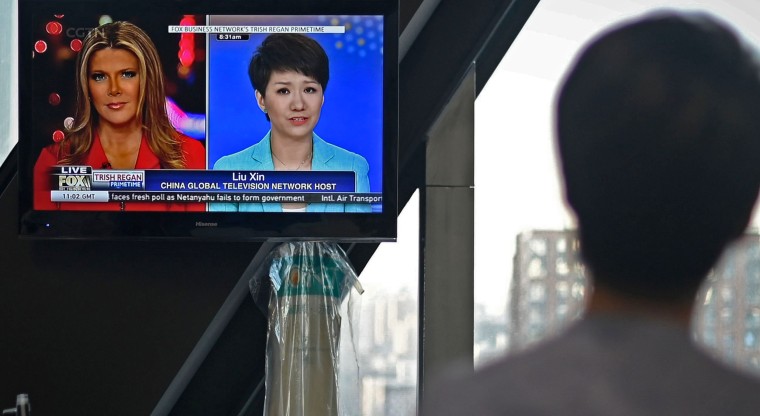With trade negotiations between the U.S. and China at an impasse, a popular Chinese TV anchor made an unusual appearance Wednesday night on the Fox Business Network to challenge the network’s portrayal of China.
Liu Xin, a host on the China Global Television Network — a multilanguage network that reaches around 30 million households in the U.S. and is run by Chinese state media — has been trading barbs for weeks with a Fox Business host, Trish Regan, on their shows and on Twitter.
"I’m not willing to give up on being the world’s largest economy so easily," Regan said on her show, "Trish Regan Primetime," this month. "I’m not OK with another country stealing it away from us.”
Regan doubled down on that in an opinion article this month criticizing China for claiming “developing nation status” at the World Trade Organization, saying that “members of the Chinese Communist ruling party, they all seem to have rather sensitive egos."
Liu has said that Regan’s eyes “spit fire."
Billed by the Chinese as a "historic debate," the on-air face-to-face was more of a polite exchange — and a chance for American viewers to hear China's side of the story, delivered in perfect English.
Regan asked Liu about intellectual property theft, one of the many issues putting the U.S. and China at odds.
Liu, who said she was not speaking on behalf of the Chinese Communist Party, did not deny that there have been intellectual property infringements and theft of commercial secrets. But she noted that many American companies sue each other for IP theft.
Regan asked how American companies can operate in China when their property is at high risk of being stolen. Liu responded, “Many American companies have been established in China and they’re very profitable.”
While Beijing is notoriously restrictive with visas for American journalists, China has been engaging more with U.S. media on American soil. Liu’s appearance is the latest example of the Chinese government taking a more aggressive approach to public relations in the U.S.
Executives of Huawei, which was recently placed on the Trump administration’s banned-company list, have given recent interviews, as has the leader of Wanda Media, which owns the cinema chain AMC Entertainment.
"This is a major step forward" in China-U.S. relations, said Christian Murck, a former director of JPMorgan Beijing and a senior adviser at PR agency APCO Worldwide.
